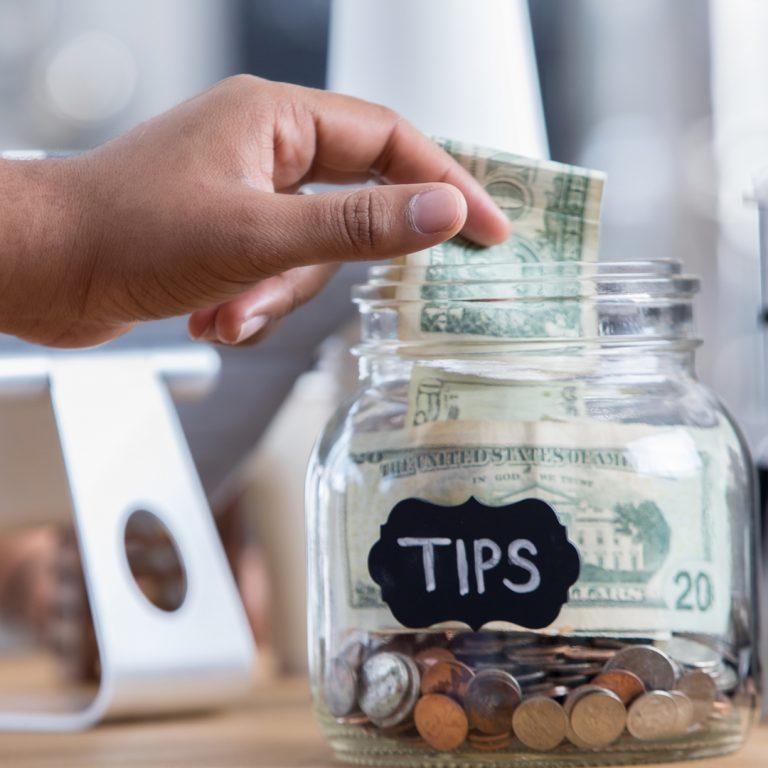Tipping is a confusing custom that gives many of us heartburn. We don’t want to shortchange great service or be embarrassed by not knowing when a gratuity or tip is warranted. Nor do we want to feel pressured to tip every brief interaction with someone in today’s vast service industry. Learn how to distinguish “must-tip” obligations from “nice-to-tip” and “don’t-need-to-tip” situations.
The Evolution of Tipping
Tipping didn’t become entrenched in our culture until 1938 when Congress passed the Fair Labor Standards Act (FLSA) guaranteeing a minimum wage to all employees except tipped workers. This made it more common for people to tip those not entitled to a minimum wage.
Today, the FLSA guarantees a $2.13 minimum wage for a tipped worker. In some states, employers must pay their employees a higher minimum wage before tips. The FLSA covers most wait staff at full-service restaurants and bartenders, and it means that for many workers in the hospitality services sector, their guaranteed hourly minimum wage is significantly lower than the $7.25 minimum of other workers.
Over time, service industry workers not included in the tipped-employee definition started displaying tip jars, encouraging patrons to reward them for great service by supplementing their relatively low wages. You’d see these jars at coffee houses, ice cream shops, and fast-food restaurants.
In the last few years, technology has transformed the tip jar into not just a jar at the check-out, but a smart-device screen or app prompt that suggests a tip for seemingly everything. Even self-service and home delivery situations beget the need for a tip. Some people like to tip and appreciate the prompts, others are either annoyed or confused by how much to tip or whether to tip at all. According to surveys conducted by USA today, 63% of Americans think tipping is expected in too many situations, and 48% are weary of being asked to tip.
Here’s how to navigate tipping in both digital and physical environments without insulting someone or destroying your budget.
Food and Drink Gratuities
Unless a full-service restaurant indicates that it’s a no-tip establishment, meaning it pays its employees the standard minimum wage ($7.25) or more, you should leave your waiter a tip. That’s because their wages are based on the assumption that you will.
While “tipflation” has pushed up the recommended minimum tipping amount to 18% in many situations, like the digital kiosks you face at restaurants, salons, and coffee counters, experts still maintain that a traditional amount of 15 to 20% is perfectly fine, and you should never pay more than you are comfortable paying. In situations where the minimum amount is 18 to 20%, feel free to enter a custom amount. Be aware, however, that sometimes a bill will include a gratuity; this means you do not need to add an additional tip.
For poor service, and when tempted to forego a tip, remember that your waiter can’t control everything. A long wait for your food may be the fault of a backed-up kitchen rather than a lax waiter. Additionally, your tip may be split among other workers in the restaurant like busboys and dishwashers.

For fast food, counter-service restaurants, take-out, or kiosk orders, the staff usually already earn a full hourly wage, and tipping is not necessary. However, a tip can be a nice gesture for good service from workers who don’t make a lot of money. For example, you might leave a 10% tip when a waiter brings a large curbside order to your car in the pouring rain.
For bartenders, the norm is tipping $1 to $2 per drink for beer or wine or 15% to 20% of the total tab. Consider tipping 18 to 20% for cocktails because they require more expertise to prepare. If you will be ordering multiple drinks over the course of a night, tipping $5 on the initial drink and then $1 for each subsequent drink afterward can be a show of goodwill to the bartender.
At coffee shops, a tip of 15% to 20% is appreciated either through an app or in person.
When food is delivered, should you tip the driver if you’ve already tipped in an app? If you have tipped in the app, the driver will receive the tip when they cash out at the end of their shift. However, many will prefer cash. Credit tips are managed by the restaurant, which means they may be shared, withheld, or taxed depending on local laws. If you don’t tip through the app and don’t have cash, the driver might hand you a credit card receipt, and you can add the tip there.
Grubhub recommends adding a 20% tip to the cost of your meal, or more if the driver has to contend with harsh weather or climbing lots of stairs. However. However, etiquette experts suggest that a tip of $3 to $5 dollars is fine, and the tip does not have to be a percentage of the cost of the order.
Note that “delivery fees” are not tips. These are separate fees that the company adds to your bill.
Traveling Tips
Whether you’re traveling around town or out of town, you run into various service workers. Social norms indicate they also deserve tips:
- Transportation by a limo driver or taxi: Experts suggest that tipping 15% to 30% is acceptable.
- Rideshare: Uber and Lyft don’t require tips, but the going rate or expectation seems to be 15 – 20% of the fare.
- Hotel staff:
- Doormen: Tipping is not necessary, but should they help you hail a cab or with your bags, consider $2 or $3
- Porters: $1 to $2 per bag with the latter common at upscale hotels
- Concierges: Around $5 per service but more for difficult requests
- Housekeeping: $1 to $2 per day. Leave a tip daily because staff rotate.
- Airport curbside baggage check: Around $1 to $2 for each standard bag, more for extra-large ones
- Cruise lines: Each company will have their own tipping rules that you should check out before your departure
Tipping Other Service Providers
Other people in your life also deserve a tip of about 15% to 20% of the total bill in appreciation for the service they provide you. The general consensus is that this includes hairstylists, barbers, manicurists, masseuses, and estheticians (facials), as well as gig workers like babysitters, dog walkers, and food and grocery delivery drivers.
You’re not obligated to tip movers or furniture or appliance delivery drivers. However, it can be a nice gesture. Check with the company providing the service first to make sure their workers are allowed to accept tips. Even if they aren’t, a bottle of water can serve as a thanks for a job well done.
Bear in mind that if you do tip generously, you are more likely to get the service you want in the future. For example, a dog sitter at short notice, a hair appointment, a ride-share, or food from a delivery app. Companies track everything these days, including your tipping history.
Holiday Bonuses and Tips
Finally, it’s also become commonplace to provide a year-end tip around the holidays for some service workers in your life. This can feel overwhelming when your budget is already stretched tight.

Rather than feeling obligated to tip everyone, focus on those that you know well or interact with often and that care for you or your children, pets or home. It can be difficult to know what the appropriate amount is. Here are some useful guidelines:
Teachers: Each school will have its own gifting policy, so it’s best to check first. Some gifts, like cash, might be construed as an attempt to influence grades. A $25 gift card to a favorite retailer is recommended by experts.
Cleaners: For cleaners, giving them the amount of one visit is suitable.
Hairstylists: For hairstylists, consider giving the cost of one visit or a gift if you tip well throughout the year.
Sitters and Caregivers: For a caregiver who attends regularly, one week’s pay is recommended. For a babysitter, an average day or evening pay and an optional small gift from the child is recommended. For a dog sitter, $50 to $200 in cash or gift card, depending on the frequency that they visit.
Door Attendants: Consider a holiday tip of $25 to $100.
Grocery Deliverers: The holidays are a time when people are busy, buying more groceries, and relying on grocery delivery or curbside pick-up. A tip of between 15% and 20% is recommended by experts, and you could add a little bit on top for a holiday tip. You can tip in the app or by cash.
Newspaper Carriers: A tip of $10 to $30 is recommended by experts.
Sanitation Workers. For sanitation workers, check with your municipality’s policy as some may forbid workers from accepting cash. If tips are allowed, $10 to $30 per person is recommended.
Mail carriers:
U.S. Postal Workers: USPS prohibits its workers from accepting more than $50-worth of gifts from a customer within a calendar year. However, they are permitted to accept a gift worth $20 or less from a customer, per occasion.
Fedex Delivery Driver: FedEx prohibits its employees from accepting cash or gift cards. That said, if you are insistent, the driver may ultimately accept the gift.
UPS Delivery Driver: UPS does not have an official tipping policy that prohibits drivers from accepting cash tips from customers; however, they are encouraged not to. If you simply must tip your UPS delivery driver, a non-cash gift worth less than $20 is recommended.
Amazon: Amazon has a few ways you can tip a driver. You can say “Thank my driver” to your Echo device or use your Alexa app. Or, you can search “thank my driver” on the search bar in your Amazon account and tip the driver of your most recent delivery.
Personal Trainers and Sports Pros: A gift card is appropriate, as is a thoughtful gift. Or, consider tipping them the cost of one session.
Navigating holiday tipping takes some thought, but keep in mind that a holiday baked good is never frowned upon and can sweeten anyone’s day!
Where have you been asked to tip lately? Tell us about it in the comment section below!






Comments Section
Please note: Comments are not monitored for member servicing inquiries and will not be published. If you have a question or comment about a Quorum product or account, please visit quorumfcu.org to submit a query with our Member Service Team. Thank you.